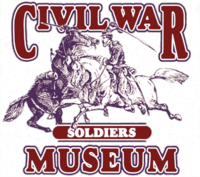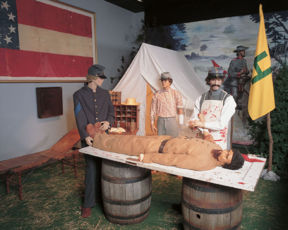Civil War Soldiers Museum
| Type | Privately owned non-profit |
| Location | 108 South Palafox Street |
| Operated by | Dr. Norman Haines |
| Director | Billie Ruth Hair |
| Opened | August 1991 |
| Closed | September 2004 (Hurricane Ivan) |
| Annual Visitors | 10,000 in 1998[1] |
| Website | cwmuseum.org |
The Civil War Soldiers Museum was a privately-owned Civil War history museum located at 108 South Palafox Street between 1991 and 2004.
The museum was owned by Dr. Norman W. Haines, Jr., a gastroenterologist who collected a number of Civil War artifacts from the battlefield at Antietam during his childhood in western Maryland. As his collection grew, he dreamed of opening a museum, which he did in August 1991.
The 4,200-square-foot facility housed an array of artifacts, with a focus on medical technology of the period (reflecting Haines's interest as a doctor), with one display depicting a lifelike amputation. The "Pensacola Room" included information about Confederate Secretary of the Navy Stephen R. Mallory and featured the handmade First National Confederate flag captured during the Battle of Santa Rosa Island on October 9, 1861.[2] There was also an exhibit about slavery, battlefield maps, weapons, artillery shells, cooking utensils, personal correspondence from soldiers and more.
The museum closed in September 2004 after the roof was ripped off by Hurricane Ivan, destroying about a fifth of the collection and damaging another fifth. The surviving artifacts were donated to the T. T. Wentworth Museum, including a 12-pound cannonball found in downtown Pensacola, a battle muster roll, and an original label from the flagstaff cleat at Fort McRee.
As of 2008 the building has not been leased to a new tenant and is being used to house the Saenger Theatre's Robert Morton pipe organ during its own restoration work.[3]
External links & references
- cwmuseum.org – Official site (offline as of 2016)
- "Man's dream of a Civil War museum is 'gone with the wind.'" Pensacola News Journal, September 28, 2004.

